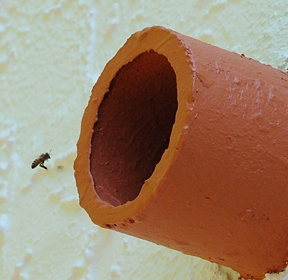- Author: Kathy Keatley Garvey

Thomas Seeley has. Many times.
"Choosing the right dwelling place is a life-or-death matter for a honeybee colony," he writes in his book, Honeybee Democracy. "If a colony chooses poorly, and so occupies a nest cavity that is too small to hold the honey stores to survive winter, or that provides it with poor protection from cold winds and hungry marauders, then it will die."
Seeley, a professor in the Department of Neurobiology and Behavior at Cornell University, where he teaches courses in animal behavior and does research on the functional organization of honey bee colonies, will present two lectures this week on the UC Davis campus.
Seeley will speak on “Swarm Intelligence in Honey Bees” from 4:10 to 5:30 p.m. on Thursday, Jan. 19 in 2 Wellman Hall as part of the UC Davis Department of Evolution and Ecology’s winter seminar series. Host is Rick Grosberg, professor of evolution and ecology.
Then on Friday, Jan. 20, Seeley will speak on “The Flight Guidance Mechanisms of Honey Bee Swarms" at 12:10 p.m. in 6 Olsen Hall as part of the UC Davis Animal Behavior Group’s winter seminar series. His host will be Brian Johnson, assistant professor at the UC Davis Department of Entomology.
Of his Thursday talk, Seeley says: “Swarm intelligence is the solving of a cognitive problem by two or more individuals who independently collect information and process it through social interactions. With the right organization, a group can overcome the cognitive limitations of its members and achieve a high collective IQ. To understand how to endow groups with swarm intelligence, it is useful to examine natural systems that have evolved this ability. An excellent example is a swarm of honey bees solving the life-or-death problem of finding a new home. A honey bee swarm accomplishes this through a process that includes collective fact-finding, open sharing of information, vigorous debating, and fair voting by the hundreds of bees in a swarm that function as nest-site scouts.”
Seeley said he will show “how these incredible insects have much to teach us when it comes to achieving collective wisdom and effective group decision making.”
Seeley, who grew up in Ithaca, N.Y., began keeping and studying bees while a high school student. He left Ithaca in 1970 to attend college at Dartmouth, but he returned home each summer to work for Roger A. Morse at the Dyce Laboratory for Honey Bee Studies at Cornell University. There he learned the craft of beekeeping and “began probing the inner workings of the honey bee colony. “
Thoroughly intrigued by the smooth functioning of bee colonies, Seeley went on to graduate school at Harvard University, earning his doctorate in 1978.
Seeley subsequently taught at Yale for six years, then worked his way home to Ithaca/Cornell in 1986, "where I’ve been ever since.”
In recognition of his scientific work, Seeley has received the Senior Scientist Prize of the Alexander von Humboldt Foundation; a Guggenheim Fellowship, and was elected a Fellow of the American Academy of Arts and Sciences.
Seeley’s research focuses on the internal organization of honey bee colonies. His work is summarized in three books: "Honeybee Ecology" (1985, Princeton University Press), 'The Wisdom of the Hive" (1995, Harvard University Press), and "Honeybee Democracy" (2010, Princeton University Press).




